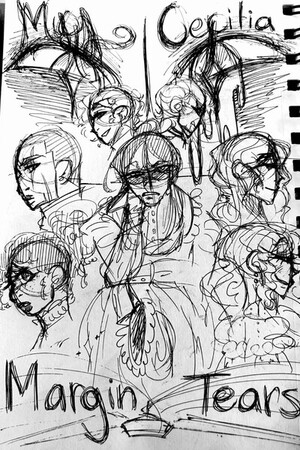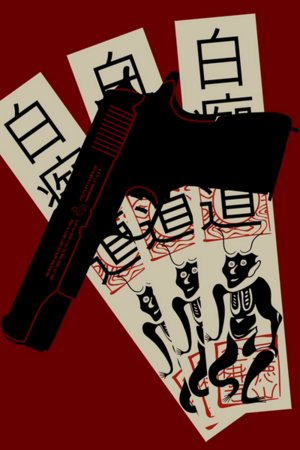Chapter 39:
Dismissal
Margin Tears: My Cecilia
The corridor outside the library was dim and hushed, dust motes turning in the weak light of late afternoon. Cecilia carried her feather duster tucked against her apron like a shield, moving silently, deliberately, as though the weight of suspicion in her heart pressed her steps flat against the carpet. She had chosen this path for its quiet, for the chance to slip unseen from one duty to the next. More and more, she had learned the art of absence: ducking away when she heard his footfalls, finding errands elsewhere whenever his shadow crossed her way.
Peregrine.
She had not meant to abandon the fragile bond that had grown between them in stolen conversations, but there were too many bodies now, too many silences filled with whispers of locked rooms and blood gone cold. If his elder brother was indeed the architect of such horrors, then any closeness with Peregrine was dangerous—both for herself and for him. She could not risk being the chain that dragged him into his brother’s abyss.
So, she withheld her glance when he entered the dining hall. She spoke no more than the necessary pleasantries when their duties overlapped. She shrank from him like light from a shuttered window.
But he noticed.
It came to a head one evening, as she crossed the back hallway near the servants’ wing. The air was damp from a passing storm, and the sconces flickered weakly. Peregrine stepped into her path with a suddenness that startled her, his hand braced against the wall, blocking her passage.
“Cecilia.” His voice was low but sharp, as though he had rehearsed this moment a dozen times in silence. “Why do you avoid me?”
She clutched the duster to her chest, eyes darting to the floor. “I—I don’t avoid, sir. Only… there is much to be done.”
“Lies.” His tone cracked with something raw, something wounded. “You used to smile when I found you in the gardens. You used to listen. And now you pass me by as though I were no more than a ghost in this house.”
Her breath trembled, but she said nothing. How could she tell him that friendship with him was a kind of death sentence? That every kindness she accepted might be twisted into cruelty by the lord’s hand?
He stepped closer, too close, his frustration spilling into a bitter laugh. “I see it now. You’ve tired of me. That’s it, isn’t it? You’ve chosen him instead—my brother. You’d rather bask in his power, his wealth, his… charm. And why not? Everyone does.”
Her head snapped up, eyes wide with alarm. “No! That isn’t—”
But he cut across her. “Do not deny it. I’ve seen the way he looks at you. And now, you turn from me as though ashamed of what? My weakness? My inferiority? Do you think I don’t know I live in his shadow?”
Cecilia’s throat tightened. She wanted to reach for him, to assure him he was wrong—but every instinct screamed that reassurance would only tether him closer, pull him deeper into the danger she was desperately trying to ward away.
She lowered her eyes again. “You mistake me, sir,” she muttered, hands clenching into fists tight enough for her blunt nails to pierce into her skin. “I do not think of you. And if you value yourself, you will leave me alone.”
The words dropped like stones between them.
For a moment, Peregrine stood rigid, his breath ragged. Then he recoiled as though struck, his hand falling from the wall. His face twisted—not only with anger, but with hurt, with the hollow echo of rejection that no explanation could soften.
“Very well,” he said, his voice cold, though his eyes burned. “If that is what you wish.”
He stepped back, letting her pass.
Cecilia’s legs carried her forward, but inside she was unmoored, the weight of her choice pressing against her ribs like an iron clasp. She had spoken cruelty where kindness had once lived, but what else could she do? If the lord’s cruelty extended to the killings that haunted the manor, then every tie she formed could become a weapon in his hands. Peregrine was already cracked and brittle beneath the long years of his brother’s shadow—what would become of him if the lord decided to use her against him?
Her chest ached as she climbed the servants’ stairs, each step heavier than the last. She did not want to hurt him. She did not want to leave that flicker of gentleness she had found in his company smothered by suspicion and bitterness. But guilt could not outweigh survival. And survival demanded strategy.
In her tiny chamber beneath the eaves, she pressed her hands to her face, the dim candlelight throwing her reflection into long, distorted shadows on the wall. She whispered to herself, not prayers but promises: I will not be trapped. I will not let him rule every beat of my heart.
If the lord thought her another toy to bend or break, then she would have to learn the contours of his cruelty, chart his patterns, and find where his power ended. He might draw blood from others, but he would not drink hers. Not if she could learn where he faltered, where arrogance blinded him, where secrecy became his undoing.
But even as resolve sharpened within her, guilt lingered, hollowing her chest. She had abandoned Peregrine to his bitterness, and in the silence left behind, she could hear the echo of his hurt—louder, in some ways, than her own heartbeat.




Please sign in to leave a comment.